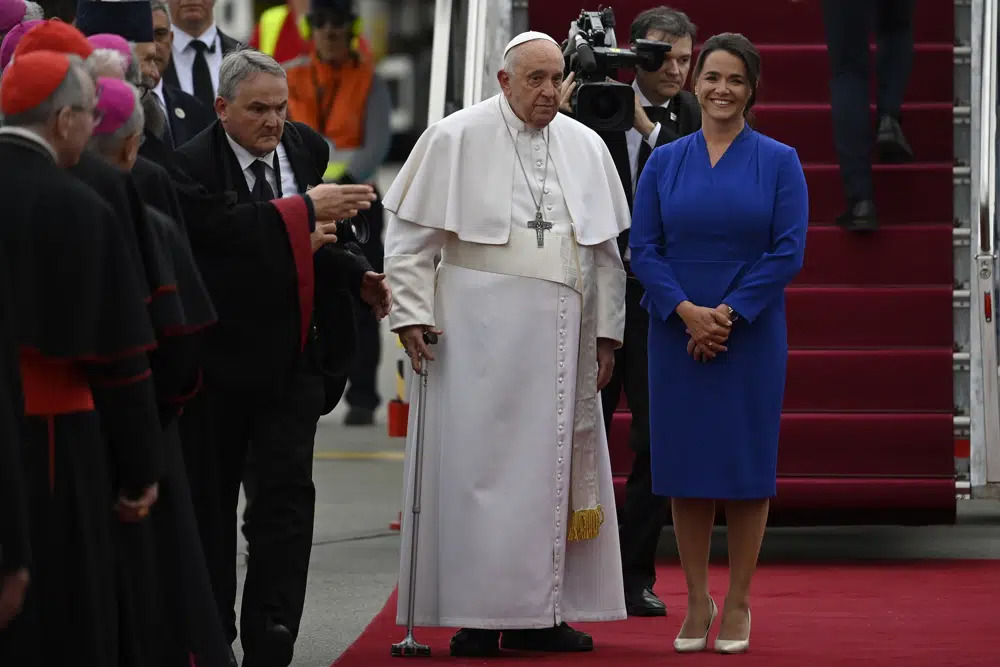RELIGION
Pope Acknowledges Climate Change to the Dismay of the GOP
The Papal Encyclical released on Thursday called for a revision of common Catholic thought concerning climate change.
Pope Francis, already hailed as the most progressive pope in decades, has continuously made strides to modernize the church’s antiquated worldview. Refusing to pass judgment on the issue of same-sex marriage and now imploring policy makers to take climate change more seriously, the changing of the guard is now in full swing.
The pope warns of the perils posed by climate change in the encyclical citing,
“Unprecedented destruction of ecosystems, with serious consequence for all of us” were the problem to continue unimpeded. He continued to say that, “Climate change is a global problem with grave implications: environmental, social, economic, political and for the distribution of goods. It represents one of the principal challenges facing humanity in our day.”
A key point that Francis made concerned the divergence of technological development and personal responsibility. As technology progresses, in turn leading to economic growth, humans have not properly tackled the responsibility that comes hand in hand with the consequences, or in the words of Francis, “Our immense technological development has not been accompanied by development in human responsibility, values and conscience.”
Imbedded within his argument is an indictment of the privileged individual. Drawing a tie between the poor population and climate change, the current status quo will only exacerbate an inequality of resources. The pope’s encyclical also commented on the human rights issues surrounding climate change, a dimension of the issue that is often overlooked. He stressed that poor people will bear the brunt of climate change.
The papal adoption of such a policy puts many GOP candidates in quite the quagmire. Conservative catholic candidates such as Jeb Bush and Marco Rubio now must weigh religion with politics. For many politicians, regardless of party, energy and gas companies have astoundingly strong lobbying positions. In rejecting the merits and science behind climate change, millions can raise from such companies to improve campaigns.
This change contradicts the views of many conservative Catholics in America. This change in papal policy will prove particularly vexing for the GOP. Regardless of which candidate happens to be nominated, this encyclical has brought climate change once again to the fore.
It will be interesting to see how each candidate approaches the topic. Backtracking on such a crucial topic is typically inadvisable, but this is a unique situation due to the religious implications. While all signs point to a continuation of denial, this would be the perfect opportunity for the GOP to shift its platform.
With the encyclical as justification, the GOP can move now to attract more young voters in anticipation for an undoubtedly close presidential race. However, with so much money on the line from strong industrial lobbys, change is unlikely to come to fruition.
To be fair, at a time of rampant economic instability and ambiguity, curbing emissions may have a negative impact on unemployment. That said, the time for drastic policy to address climate change has come and pass.
The pope has demanded global and comprehensive action to address the environmental issues that plague the world. Leaders should listen.
RELIGION
Denmark passes bill to stop Koran burnings.
Denmark passes a bill to stop Koran burnings. After riots in Muslim nations over the destruction of Islam’s holy book prompted Danish security worries, the Danish parliament enacted a law on Thursday that makes it illegal to burn copies of the Koran in public places. The bill was introduced in response to the protests in Muslim nations.
During this year, Denmark and Sweden were the sites of several public demonstrations in which anti-Islam activists destroyed or otherwise damaged copies of the Koran. These demonstrations sparked tensions with Muslims and prompted calls for the governments of the Nordic countries to prohibit the practice.
Even though there were concerns that the burning of the Koran might lead to assaults by Islamists, Denmark attempted to find a middle ground between the constitutionally protected right to freedom of expression, which includes the ability to criticize religion and the need to maintain national security.
At home, opponents in Sweden and Denmark have claimed that any restrictions placed on criticizing religion, including the burning of Korans, harm the liberal liberties that have been fought so hard to achieve in the respective regions.
For this, history will cast a severe judgment on us, and there is a strong reason for that. “What it all comes down to is whether a restriction on freedom of speech is determined by us or whether it is dictated from the outside,” said Inger Stojberg, the head of the anti-immigration Denmark Democrats party, which opposed the ban. Stojberg disagreed with the prohibition.
Denmark’s government, a coalition of moderate parties, has stated that the new restrictions would have only a tiny influence on the right to free speech and that it is still constitutional to criticize religion in other ways.
The government has stated that anyone who disobeys the new rule will face penalties or possibly imprisonment for up to two years.
Similar to Denmark, Sweden is mulling over measures to restrict the destruction of the Koran legally, but the country is adopting a different approach than Denmark. It is investigating whether or not the police should consider the state of national security when making decisions about applications for public demonstrations.
AFRICA
President’s “Non-Starter” Deal Will Not End Shutdown
This week, shutdown polls showed the American public blame President Trump for the government shutdown. To divert Americans’ attention elsewhere, President Trump tried to make a deal with Democrats on Saturday. Among other elements, the deal consists of three years’ legislative relief to DACA recipients and a three-year extension of temporary protected status for 300,000 immigrants whose protected status is about to expire. In exchange for these provisions, $5.7 billion border wall funding will finally be paid for. The so-called deal is a non-starter because it contains the wall House Speaker Pelosi refuses to compromise on. Moreover, Democrats seek to reopen government before beginning negotiations on border security. Democrats are presenting a united front and refusing to budge on the wall together, at least until the government is opened.
To Pelosi, the wall is an expensive and unnecessary item border security can do perfectly fine without. To President Trump, the wall is an integral part of his campaign promise and essential to seal off the border, stopping illegal crooks and helping border security officials do their jobs.
Support for the wall is clearly divided along partisan lines. Many Republican lawmakers, including Senate Majority Leader Mitch McConnell, supported President Trump’s latest proposal. McConnell said he will floor Trump’s proposal in the Senate next week. Sen. Mitt Romney is also in favor of the proposal. House Republicans too considered Trump’s deal to be bipartisan, fair, and reasonable.
Speaker Pelosi said any one item in the deal was not likely to pass the House, let alone the compilation of all items. Moreover, Trump’s proposal does not offer a permanent solution to Dreamers and TPS recipients. Dreamers and TPS recipients had their protections initially removed by President Trump. President Trump’s deal with the Democrats can hardly be called a deal at all considering the Democrats were not consulted before Trump’s announcement and none of their policy demands were met. His proposal is a consolidation of items Democrats previously voted for and band-aid solutions to Democratic immigration priorities.
Other Democrats such as Sen. Tim Kaine and Mark Werner, both of whom represent Virginia where many federal workers reside, were displeased President Trump did not address the sufferings of federal workers going without pay. Without their paychecks, federal workers, who tend to be paid less overall, can barely make ends meet with mortgage and child care payments. There is increasing dependence on food banks. The government shutdown enters its 29th day.
Featured image via Flickr/The White House
AFRICA
Young Man Who Targeted the White House Arrested
US Attorney for the Northern District of Georgia, Byung J. Pak, announced the arrest of a man plotting to blow a hole through the White House for access and subsequently corner people inside with semi-automatic rifles. The backpack he was supposed to wear would have contained a bomb for him to become a “martyr”.
Hasher Taheb, 21, is from Cumming, Georgia. He plotted to attack the White House, the Statue of Liberty, and other locations in Washington, D.C. Taheb was investigated by the Atlanta Joint Terrorism Task Force and the FBI for a year after a community member gave local authorities the hint Taheb was becoming a dangerous radical. The tip, given in March 2018, said Taheb had, “become radicalized, changed his name, and made plans to travel abroad.”
In July, Taheb applied for a US passport and put his car on sale. Taheb told an FBI informant who showed interest in buying the car that he was selling the car to pay for his trip abroad to ISIS-controlled territories. He teamed up with this FBI informant and relayed to him his passion for jihad along with the targets he had in mind.
On December 2, Taheb met with the informant and an undercover FBI agent. He communicated his desire to be a “martyr” and inflict as much damage as possible in the US. Taheb drew a diagram of the West Wing in the White House and requested assistance in obtaining weapons and explosive devices from the undercover agent on December 7. On December 15, Taheb uploaded a 40-page manifesto about jihad to Google Docs and started a group chat with the informant and undercover agent for discussing imminent attacks planned.
On Saturday, Taheb met the FBI informant and informed him he was going to initiate attacks on Thursday. On Wednesday, Taheb and the two FBI associates conferred in a store parking lot located in Buford, Georgia to exchange their automobiles for rifles and explosives. A second FBI informant joined them and instructed Taheb on how to use the weapons. Taheb was arrested at the scene after he gave away his car keys and took the explosives he was promised, transferring them to a rental vehicle. Chris Hacker, head of Atlanta’s FBI branch, said authorities think Taheb was acting alone aside from the FBI associates Taheb expected to carry out his plans with.
Taheb appeared in an Atlanta court, charged with attempts to damage federal properties using improvised explosives. Pak said prosecutors will bring the case before a grand jury. Taheb will next appear in court on January 24 at 3:00 p.m. ET.
Featured image via Flickr/The White House
-

 Europe7 months ago
Europe7 months agoRussia’s Shoigu accuses the West of seeking to expand the Ukraine war to the Asia-Pacific.
-

 Geopolitics & Foreign Policy6 months ago
Geopolitics & Foreign Policy6 months agoTurkey’s Erdogan says he may visit Egypt soon, discuss Gaza patients -media.
-

 America8 months ago
America8 months agoRepublican US House to hold first Biden impeachment inquiry hearing
-

 Geopolitics & Foreign Policy6 months ago
Geopolitics & Foreign Policy6 months agoRussia deploys new nuclear missile in Kaluga region – RIA
-

 Geopolitics & Foreign Policy6 months ago
Geopolitics & Foreign Policy6 months agoCeasefire takes hold in Gaza ahead of hostage release; aid enters enclave.
-

 Gender, Sexuality & Identity8 months ago
Gender, Sexuality & Identity8 months agoGreenland women ask Denmark for compensation over involuntary birth control.
-

 Global Issues & Cooperation8 months ago
Global Issues & Cooperation8 months agoHuman rights in Russia have ‘significantly deteriorated’ – UN expert.
-

 ECONOMY5 months ago
ECONOMY5 months agoFinland will sign a defense pact with the US.













